Measuring Health
VerifiedAdded on 2023/04/23
|11
|3223
|458
AI Summary
This essay focuses on the health complication of an individual such as depression and dementia, risk factor involved, screening procedure and the treatment of the based on his health issue.
Contribute Materials
Your contribution can guide someone’s learning journey. Share your
documents today.
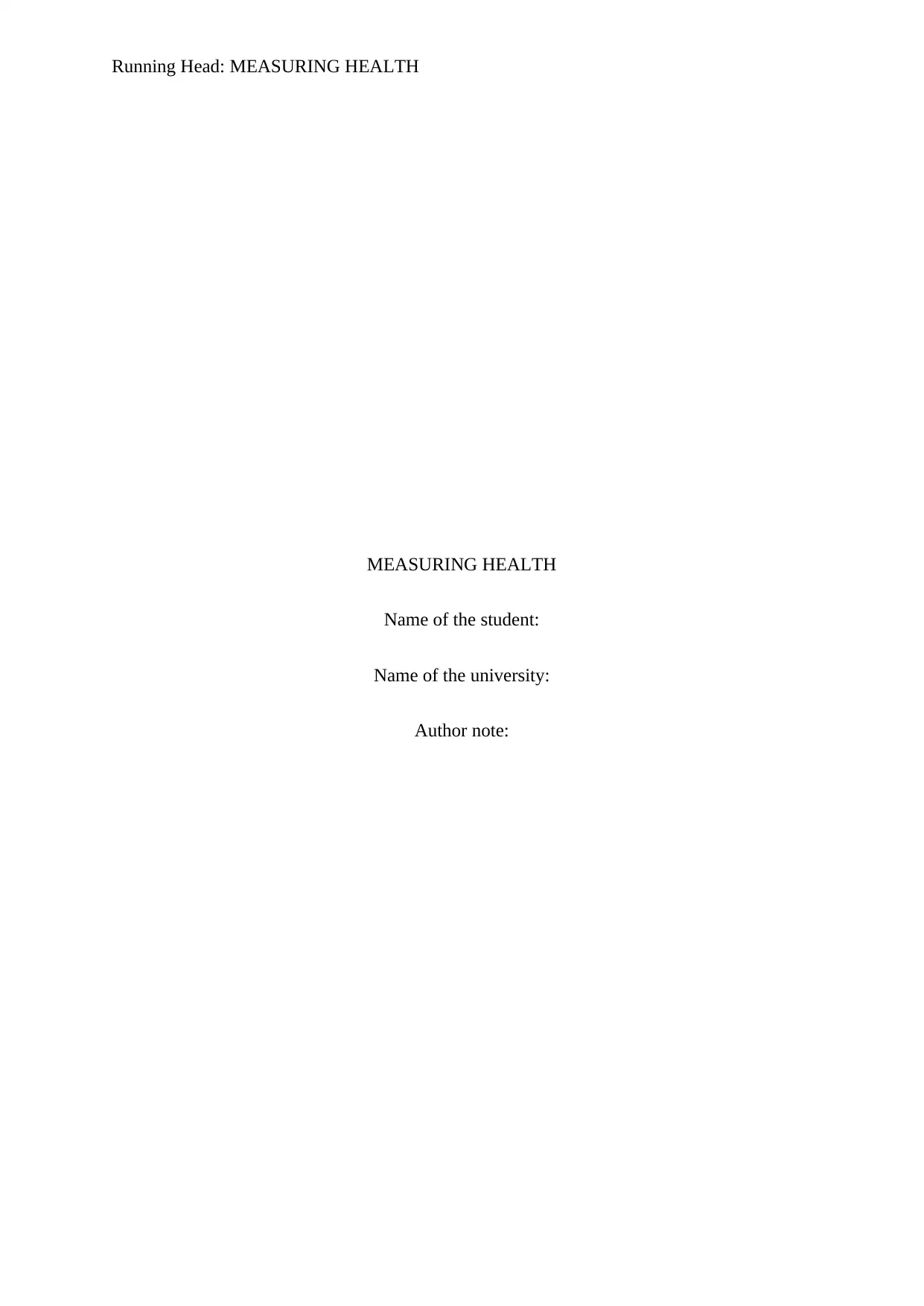
Running Head: MEASURING HEALTH
MEASURING HEALTH
Name of the student:
Name of the university:
Author note:
MEASURING HEALTH
Name of the student:
Name of the university:
Author note:
Secure Best Marks with AI Grader
Need help grading? Try our AI Grader for instant feedback on your assignments.
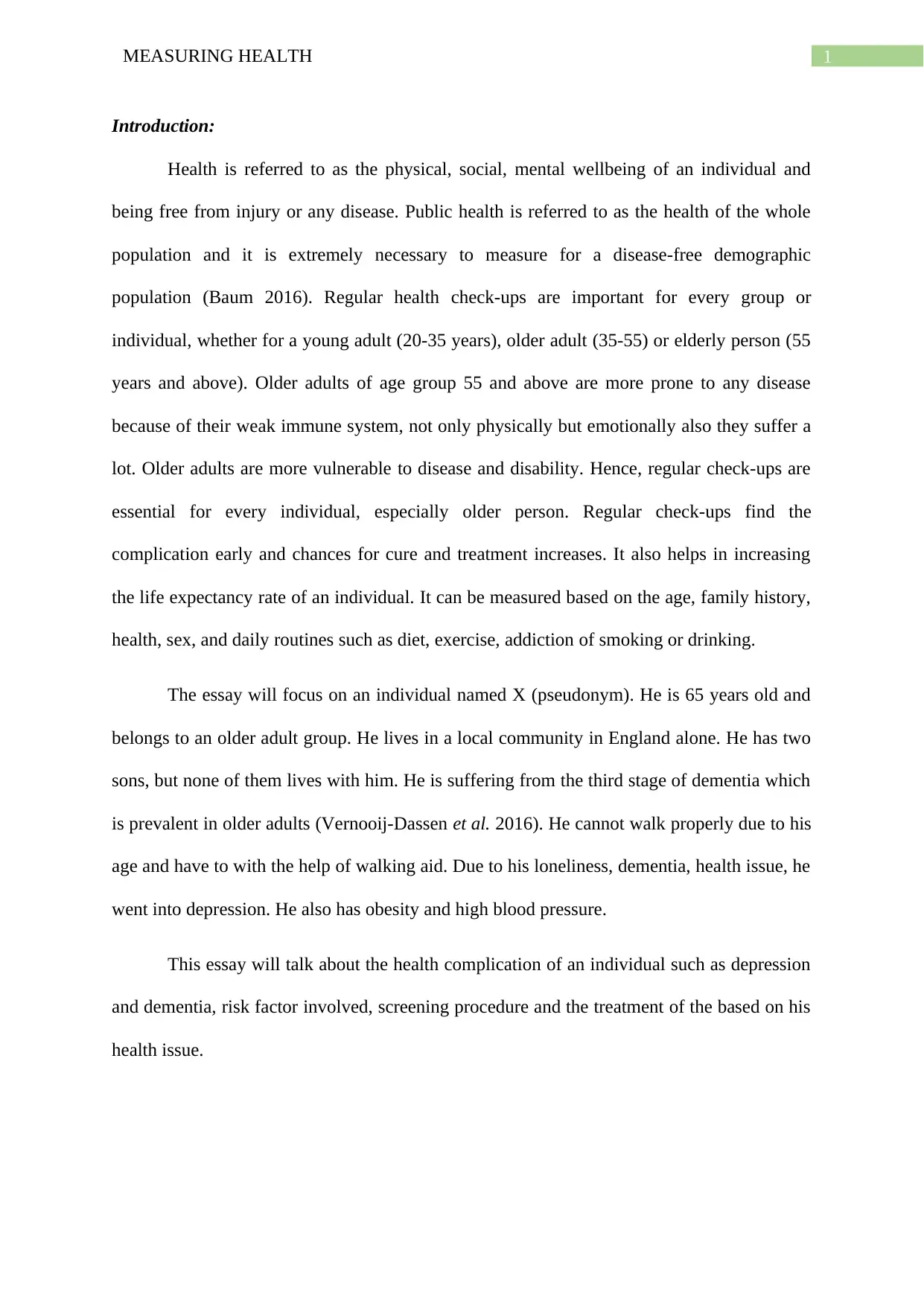
1MEASURING HEALTH
Introduction:
Health is referred to as the physical, social, mental wellbeing of an individual and
being free from injury or any disease. Public health is referred to as the health of the whole
population and it is extremely necessary to measure for a disease-free demographic
population (Baum 2016). Regular health check-ups are important for every group or
individual, whether for a young adult (20-35 years), older adult (35-55) or elderly person (55
years and above). Older adults of age group 55 and above are more prone to any disease
because of their weak immune system, not only physically but emotionally also they suffer a
lot. Older adults are more vulnerable to disease and disability. Hence, regular check-ups are
essential for every individual, especially older person. Regular check-ups find the
complication early and chances for cure and treatment increases. It also helps in increasing
the life expectancy rate of an individual. It can be measured based on the age, family history,
health, sex, and daily routines such as diet, exercise, addiction of smoking or drinking.
The essay will focus on an individual named X (pseudonym). He is 65 years old and
belongs to an older adult group. He lives in a local community in England alone. He has two
sons, but none of them lives with him. He is suffering from the third stage of dementia which
is prevalent in older adults (Vernooij-Dassen et al. 2016). He cannot walk properly due to his
age and have to with the help of walking aid. Due to his loneliness, dementia, health issue, he
went into depression. He also has obesity and high blood pressure.
This essay will talk about the health complication of an individual such as depression
and dementia, risk factor involved, screening procedure and the treatment of the based on his
health issue.
Introduction:
Health is referred to as the physical, social, mental wellbeing of an individual and
being free from injury or any disease. Public health is referred to as the health of the whole
population and it is extremely necessary to measure for a disease-free demographic
population (Baum 2016). Regular health check-ups are important for every group or
individual, whether for a young adult (20-35 years), older adult (35-55) or elderly person (55
years and above). Older adults of age group 55 and above are more prone to any disease
because of their weak immune system, not only physically but emotionally also they suffer a
lot. Older adults are more vulnerable to disease and disability. Hence, regular check-ups are
essential for every individual, especially older person. Regular check-ups find the
complication early and chances for cure and treatment increases. It also helps in increasing
the life expectancy rate of an individual. It can be measured based on the age, family history,
health, sex, and daily routines such as diet, exercise, addiction of smoking or drinking.
The essay will focus on an individual named X (pseudonym). He is 65 years old and
belongs to an older adult group. He lives in a local community in England alone. He has two
sons, but none of them lives with him. He is suffering from the third stage of dementia which
is prevalent in older adults (Vernooij-Dassen et al. 2016). He cannot walk properly due to his
age and have to with the help of walking aid. Due to his loneliness, dementia, health issue, he
went into depression. He also has obesity and high blood pressure.
This essay will talk about the health complication of an individual such as depression
and dementia, risk factor involved, screening procedure and the treatment of the based on his
health issue.
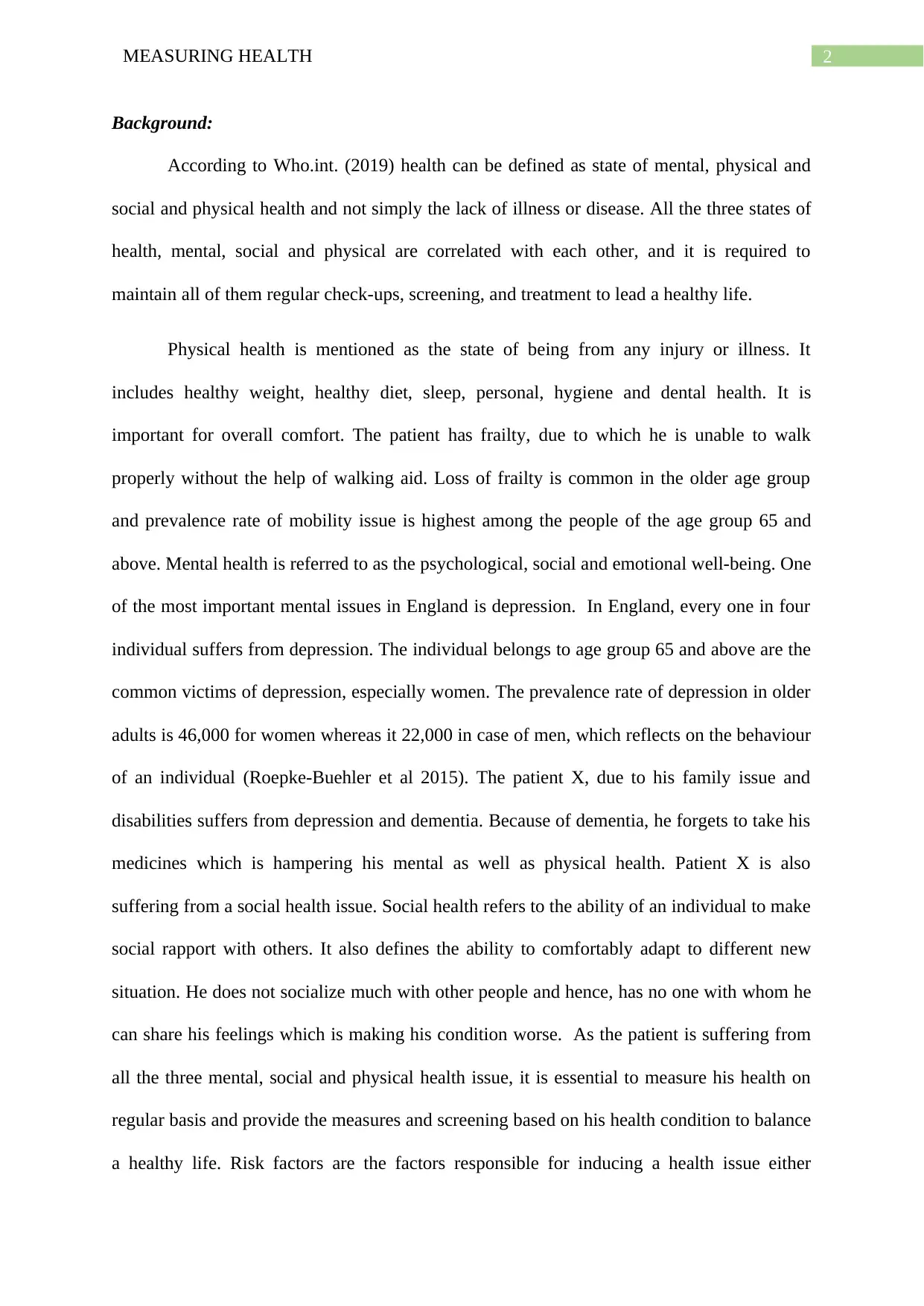
2MEASURING HEALTH
Background:
According to Who.int. (2019) health can be defined as state of mental, physical and
social and physical health and not simply the lack of illness or disease. All the three states of
health, mental, social and physical are correlated with each other, and it is required to
maintain all of them regular check-ups, screening, and treatment to lead a healthy life.
Physical health is mentioned as the state of being from any injury or illness. It
includes healthy weight, healthy diet, sleep, personal, hygiene and dental health. It is
important for overall comfort. The patient has frailty, due to which he is unable to walk
properly without the help of walking aid. Loss of frailty is common in the older age group
and prevalence rate of mobility issue is highest among the people of the age group 65 and
above. Mental health is referred to as the psychological, social and emotional well-being. One
of the most important mental issues in England is depression. In England, every one in four
individual suffers from depression. The individual belongs to age group 65 and above are the
common victims of depression, especially women. The prevalence rate of depression in older
adults is 46,000 for women whereas it 22,000 in case of men, which reflects on the behaviour
of an individual (Roepke-Buehler et al 2015). The patient X, due to his family issue and
disabilities suffers from depression and dementia. Because of dementia, he forgets to take his
medicines which is hampering his mental as well as physical health. Patient X is also
suffering from a social health issue. Social health refers to the ability of an individual to make
social rapport with others. It also defines the ability to comfortably adapt to different new
situation. He does not socialize much with other people and hence, has no one with whom he
can share his feelings which is making his condition worse. As the patient is suffering from
all the three mental, social and physical health issue, it is essential to measure his health on
regular basis and provide the measures and screening based on his health condition to balance
a healthy life. Risk factors are the factors responsible for inducing a health issue either
Background:
According to Who.int. (2019) health can be defined as state of mental, physical and
social and physical health and not simply the lack of illness or disease. All the three states of
health, mental, social and physical are correlated with each other, and it is required to
maintain all of them regular check-ups, screening, and treatment to lead a healthy life.
Physical health is mentioned as the state of being from any injury or illness. It
includes healthy weight, healthy diet, sleep, personal, hygiene and dental health. It is
important for overall comfort. The patient has frailty, due to which he is unable to walk
properly without the help of walking aid. Loss of frailty is common in the older age group
and prevalence rate of mobility issue is highest among the people of the age group 65 and
above. Mental health is referred to as the psychological, social and emotional well-being. One
of the most important mental issues in England is depression. In England, every one in four
individual suffers from depression. The individual belongs to age group 65 and above are the
common victims of depression, especially women. The prevalence rate of depression in older
adults is 46,000 for women whereas it 22,000 in case of men, which reflects on the behaviour
of an individual (Roepke-Buehler et al 2015). The patient X, due to his family issue and
disabilities suffers from depression and dementia. Because of dementia, he forgets to take his
medicines which is hampering his mental as well as physical health. Patient X is also
suffering from a social health issue. Social health refers to the ability of an individual to make
social rapport with others. It also defines the ability to comfortably adapt to different new
situation. He does not socialize much with other people and hence, has no one with whom he
can share his feelings which is making his condition worse. As the patient is suffering from
all the three mental, social and physical health issue, it is essential to measure his health on
regular basis and provide the measures and screening based on his health condition to balance
a healthy life. Risk factors are the factors responsible for inducing a health issue either
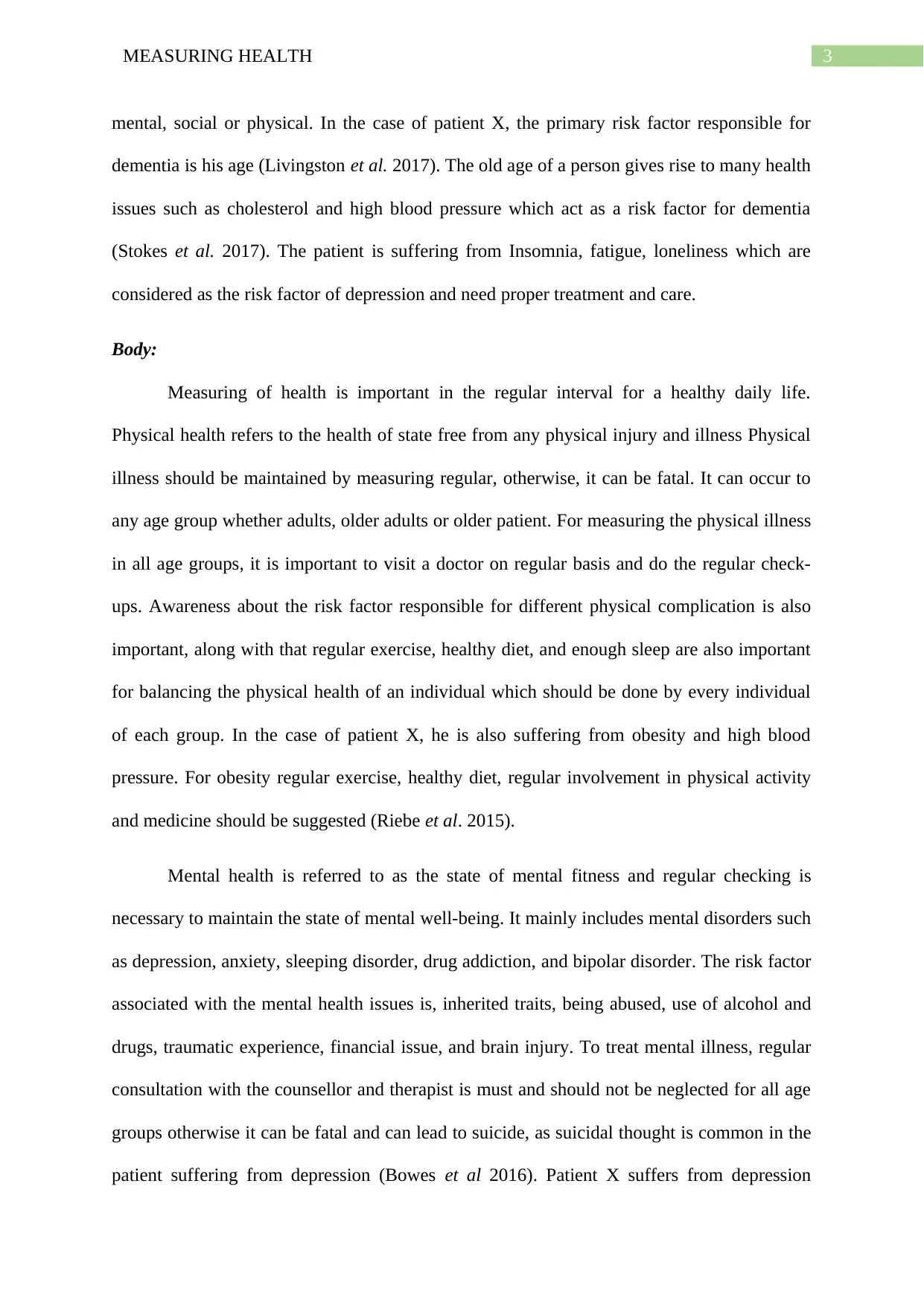
3MEASURING HEALTH
mental, social or physical. In the case of patient X, the primary risk factor responsible for
dementia is his age (Livingston et al. 2017). The old age of a person gives rise to many health
issues such as cholesterol and high blood pressure which act as a risk factor for dementia
(Stokes et al. 2017). The patient is suffering from Insomnia, fatigue, loneliness which are
considered as the risk factor of depression and need proper treatment and care.
Body:
Measuring of health is important in the regular interval for a healthy daily life.
Physical health refers to the health of state free from any physical injury and illness Physical
illness should be maintained by measuring regular, otherwise, it can be fatal. It can occur to
any age group whether adults, older adults or older patient. For measuring the physical illness
in all age groups, it is important to visit a doctor on regular basis and do the regular check-
ups. Awareness about the risk factor responsible for different physical complication is also
important, along with that regular exercise, healthy diet, and enough sleep are also important
for balancing the physical health of an individual which should be done by every individual
of each group. In the case of patient X, he is also suffering from obesity and high blood
pressure. For obesity regular exercise, healthy diet, regular involvement in physical activity
and medicine should be suggested (Riebe et al. 2015).
Mental health is referred to as the state of mental fitness and regular checking is
necessary to maintain the state of mental well-being. It mainly includes mental disorders such
as depression, anxiety, sleeping disorder, drug addiction, and bipolar disorder. The risk factor
associated with the mental health issues is, inherited traits, being abused, use of alcohol and
drugs, traumatic experience, financial issue, and brain injury. To treat mental illness, regular
consultation with the counsellor and therapist is must and should not be neglected for all age
groups otherwise it can be fatal and can lead to suicide, as suicidal thought is common in the
patient suffering from depression (Bowes et al 2016). Patient X suffers from depression
mental, social or physical. In the case of patient X, the primary risk factor responsible for
dementia is his age (Livingston et al. 2017). The old age of a person gives rise to many health
issues such as cholesterol and high blood pressure which act as a risk factor for dementia
(Stokes et al. 2017). The patient is suffering from Insomnia, fatigue, loneliness which are
considered as the risk factor of depression and need proper treatment and care.
Body:
Measuring of health is important in the regular interval for a healthy daily life.
Physical health refers to the health of state free from any physical injury and illness Physical
illness should be maintained by measuring regular, otherwise, it can be fatal. It can occur to
any age group whether adults, older adults or older patient. For measuring the physical illness
in all age groups, it is important to visit a doctor on regular basis and do the regular check-
ups. Awareness about the risk factor responsible for different physical complication is also
important, along with that regular exercise, healthy diet, and enough sleep are also important
for balancing the physical health of an individual which should be done by every individual
of each group. In the case of patient X, he is also suffering from obesity and high blood
pressure. For obesity regular exercise, healthy diet, regular involvement in physical activity
and medicine should be suggested (Riebe et al. 2015).
Mental health is referred to as the state of mental fitness and regular checking is
necessary to maintain the state of mental well-being. It mainly includes mental disorders such
as depression, anxiety, sleeping disorder, drug addiction, and bipolar disorder. The risk factor
associated with the mental health issues is, inherited traits, being abused, use of alcohol and
drugs, traumatic experience, financial issue, and brain injury. To treat mental illness, regular
consultation with the counsellor and therapist is must and should not be neglected for all age
groups otherwise it can be fatal and can lead to suicide, as suicidal thought is common in the
patient suffering from depression (Bowes et al 2016). Patient X suffers from depression
Secure Best Marks with AI Grader
Need help grading? Try our AI Grader for instant feedback on your assignments.
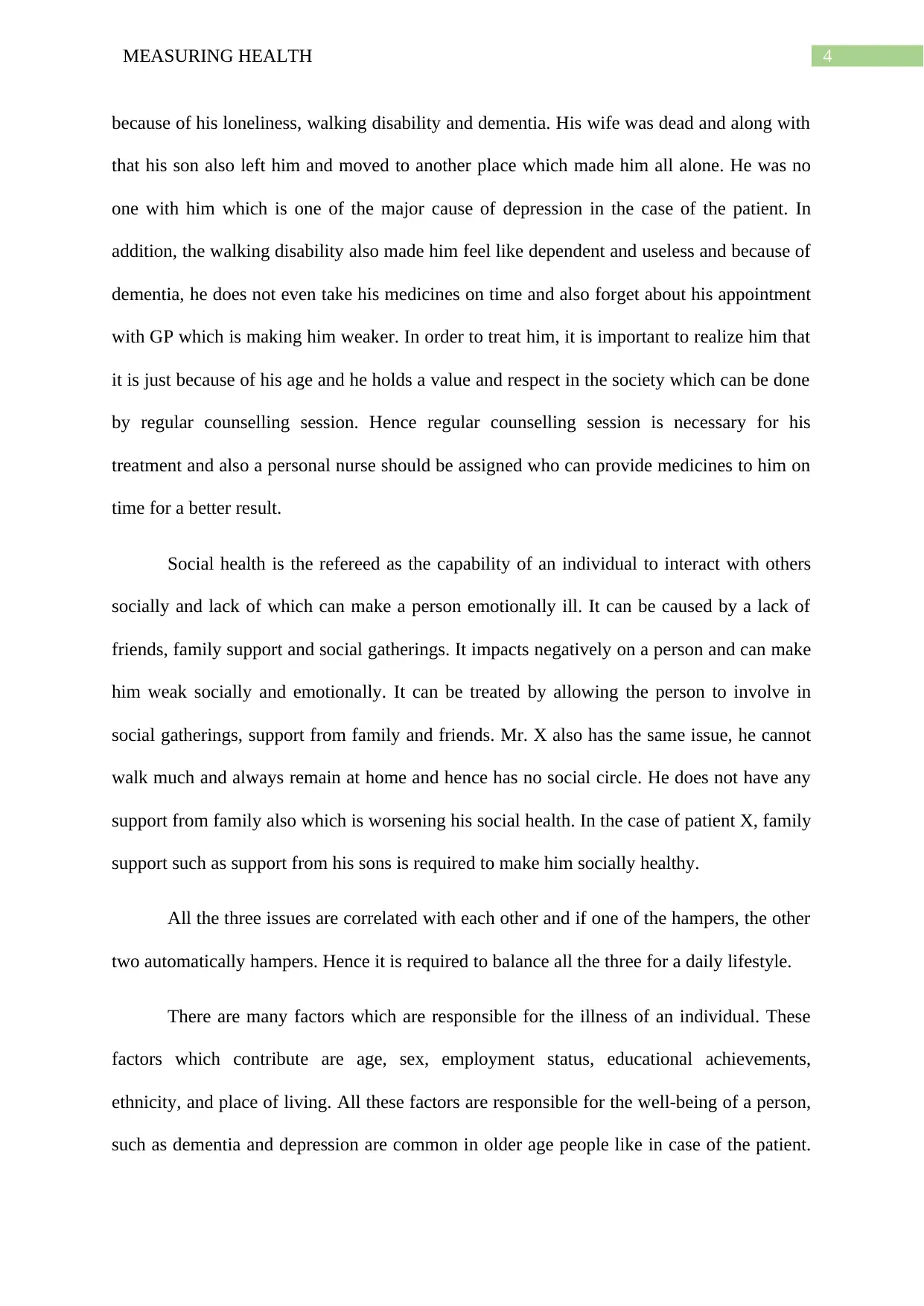
4MEASURING HEALTH
because of his loneliness, walking disability and dementia. His wife was dead and along with
that his son also left him and moved to another place which made him all alone. He was no
one with him which is one of the major cause of depression in the case of the patient. In
addition, the walking disability also made him feel like dependent and useless and because of
dementia, he does not even take his medicines on time and also forget about his appointment
with GP which is making him weaker. In order to treat him, it is important to realize him that
it is just because of his age and he holds a value and respect in the society which can be done
by regular counselling session. Hence regular counselling session is necessary for his
treatment and also a personal nurse should be assigned who can provide medicines to him on
time for a better result.
Social health is the refereed as the capability of an individual to interact with others
socially and lack of which can make a person emotionally ill. It can be caused by a lack of
friends, family support and social gatherings. It impacts negatively on a person and can make
him weak socially and emotionally. It can be treated by allowing the person to involve in
social gatherings, support from family and friends. Mr. X also has the same issue, he cannot
walk much and always remain at home and hence has no social circle. He does not have any
support from family also which is worsening his social health. In the case of patient X, family
support such as support from his sons is required to make him socially healthy.
All the three issues are correlated with each other and if one of the hampers, the other
two automatically hampers. Hence it is required to balance all the three for a daily lifestyle.
There are many factors which are responsible for the illness of an individual. These
factors which contribute are age, sex, employment status, educational achievements,
ethnicity, and place of living. All these factors are responsible for the well-being of a person,
such as dementia and depression are common in older age people like in case of the patient.
because of his loneliness, walking disability and dementia. His wife was dead and along with
that his son also left him and moved to another place which made him all alone. He was no
one with him which is one of the major cause of depression in the case of the patient. In
addition, the walking disability also made him feel like dependent and useless and because of
dementia, he does not even take his medicines on time and also forget about his appointment
with GP which is making him weaker. In order to treat him, it is important to realize him that
it is just because of his age and he holds a value and respect in the society which can be done
by regular counselling session. Hence regular counselling session is necessary for his
treatment and also a personal nurse should be assigned who can provide medicines to him on
time for a better result.
Social health is the refereed as the capability of an individual to interact with others
socially and lack of which can make a person emotionally ill. It can be caused by a lack of
friends, family support and social gatherings. It impacts negatively on a person and can make
him weak socially and emotionally. It can be treated by allowing the person to involve in
social gatherings, support from family and friends. Mr. X also has the same issue, he cannot
walk much and always remain at home and hence has no social circle. He does not have any
support from family also which is worsening his social health. In the case of patient X, family
support such as support from his sons is required to make him socially healthy.
All the three issues are correlated with each other and if one of the hampers, the other
two automatically hampers. Hence it is required to balance all the three for a daily lifestyle.
There are many factors which are responsible for the illness of an individual. These
factors which contribute are age, sex, employment status, educational achievements,
ethnicity, and place of living. All these factors are responsible for the well-being of a person,
such as dementia and depression are common in older age people like in case of the patient.
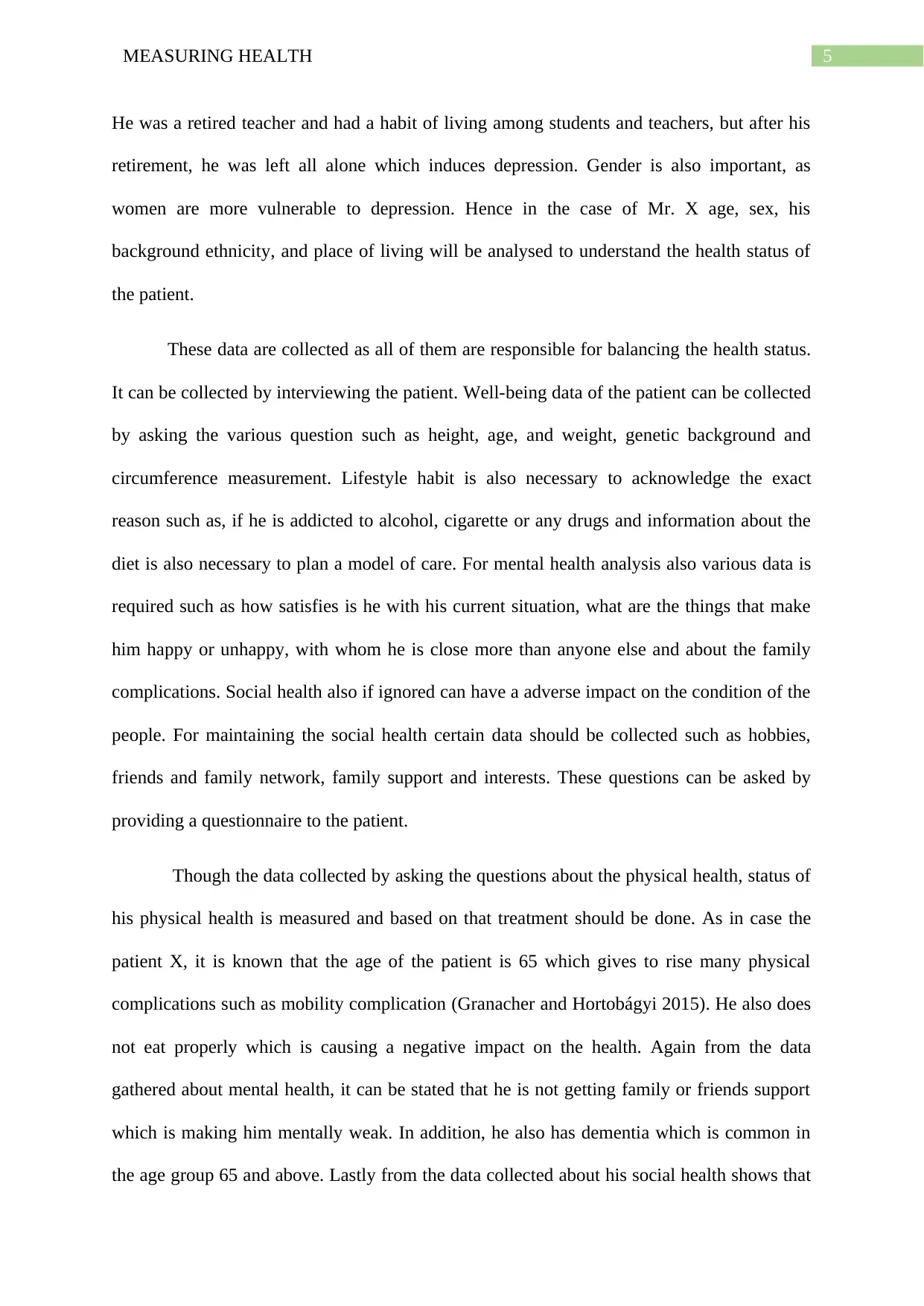
5MEASURING HEALTH
He was a retired teacher and had a habit of living among students and teachers, but after his
retirement, he was left all alone which induces depression. Gender is also important, as
women are more vulnerable to depression. Hence in the case of Mr. X age, sex, his
background ethnicity, and place of living will be analysed to understand the health status of
the patient.
These data are collected as all of them are responsible for balancing the health status.
It can be collected by interviewing the patient. Well-being data of the patient can be collected
by asking the various question such as height, age, and weight, genetic background and
circumference measurement. Lifestyle habit is also necessary to acknowledge the exact
reason such as, if he is addicted to alcohol, cigarette or any drugs and information about the
diet is also necessary to plan a model of care. For mental health analysis also various data is
required such as how satisfies is he with his current situation, what are the things that make
him happy or unhappy, with whom he is close more than anyone else and about the family
complications. Social health also if ignored can have a adverse impact on the condition of the
people. For maintaining the social health certain data should be collected such as hobbies,
friends and family network, family support and interests. These questions can be asked by
providing a questionnaire to the patient.
Though the data collected by asking the questions about the physical health, status of
his physical health is measured and based on that treatment should be done. As in case the
patient X, it is known that the age of the patient is 65 which gives to rise many physical
complications such as mobility complication (Granacher and Hortobágyi 2015). He also does
not eat properly which is causing a negative impact on the health. Again from the data
gathered about mental health, it can be stated that he is not getting family or friends support
which is making him mentally weak. In addition, he also has dementia which is common in
the age group 65 and above. Lastly from the data collected about his social health shows that
He was a retired teacher and had a habit of living among students and teachers, but after his
retirement, he was left all alone which induces depression. Gender is also important, as
women are more vulnerable to depression. Hence in the case of Mr. X age, sex, his
background ethnicity, and place of living will be analysed to understand the health status of
the patient.
These data are collected as all of them are responsible for balancing the health status.
It can be collected by interviewing the patient. Well-being data of the patient can be collected
by asking the various question such as height, age, and weight, genetic background and
circumference measurement. Lifestyle habit is also necessary to acknowledge the exact
reason such as, if he is addicted to alcohol, cigarette or any drugs and information about the
diet is also necessary to plan a model of care. For mental health analysis also various data is
required such as how satisfies is he with his current situation, what are the things that make
him happy or unhappy, with whom he is close more than anyone else and about the family
complications. Social health also if ignored can have a adverse impact on the condition of the
people. For maintaining the social health certain data should be collected such as hobbies,
friends and family network, family support and interests. These questions can be asked by
providing a questionnaire to the patient.
Though the data collected by asking the questions about the physical health, status of
his physical health is measured and based on that treatment should be done. As in case the
patient X, it is known that the age of the patient is 65 which gives to rise many physical
complications such as mobility complication (Granacher and Hortobágyi 2015). He also does
not eat properly which is causing a negative impact on the health. Again from the data
gathered about mental health, it can be stated that he is not getting family or friends support
which is making him mentally weak. In addition, he also has dementia which is common in
the age group 65 and above. Lastly from the data collected about his social health shows that
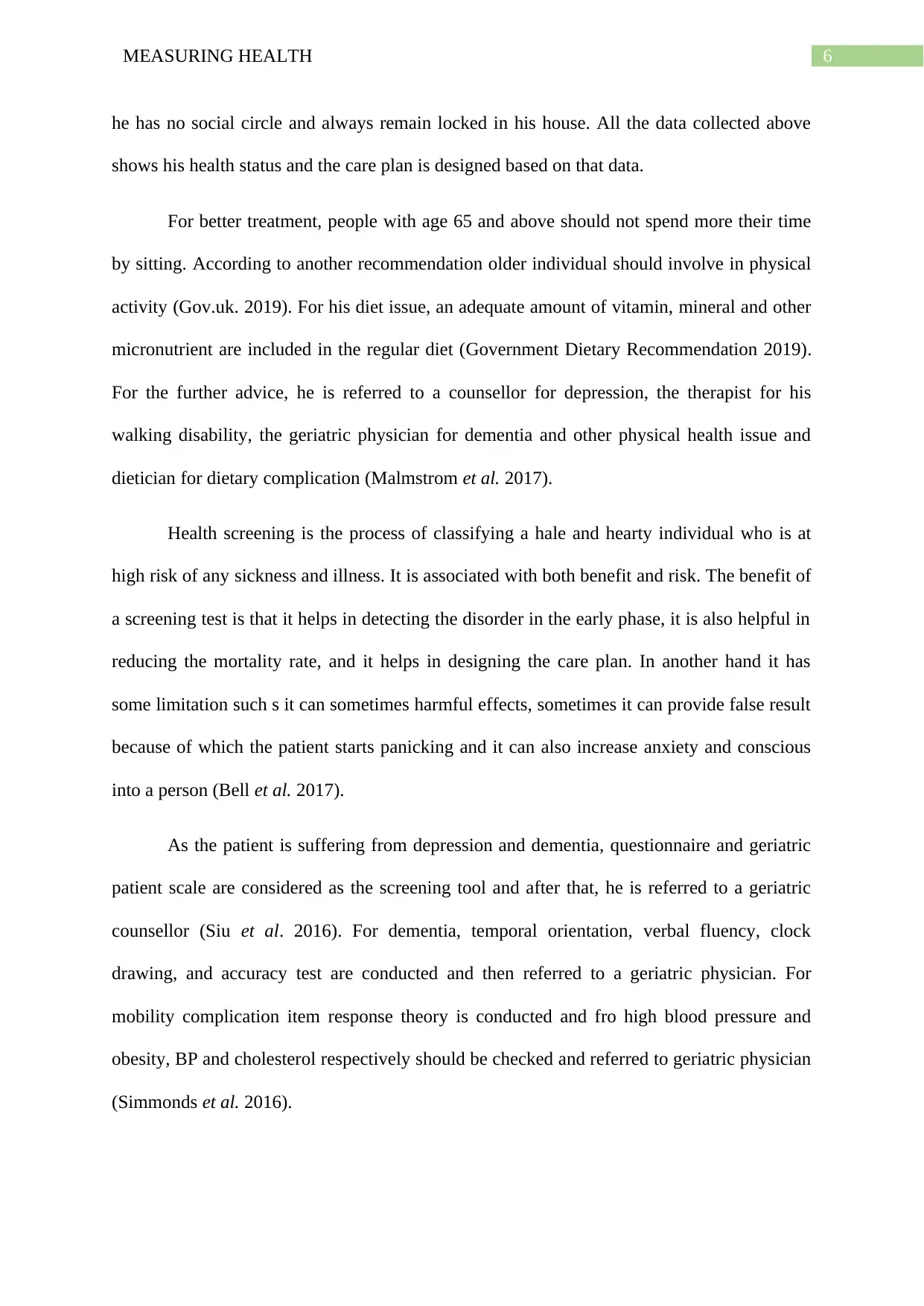
6MEASURING HEALTH
he has no social circle and always remain locked in his house. All the data collected above
shows his health status and the care plan is designed based on that data.
For better treatment, people with age 65 and above should not spend more their time
by sitting. According to another recommendation older individual should involve in physical
activity (Gov.uk. 2019). For his diet issue, an adequate amount of vitamin, mineral and other
micronutrient are included in the regular diet (Government Dietary Recommendation 2019).
For the further advice, he is referred to a counsellor for depression, the therapist for his
walking disability, the geriatric physician for dementia and other physical health issue and
dietician for dietary complication (Malmstrom et al. 2017).
Health screening is the process of classifying a hale and hearty individual who is at
high risk of any sickness and illness. It is associated with both benefit and risk. The benefit of
a screening test is that it helps in detecting the disorder in the early phase, it is also helpful in
reducing the mortality rate, and it helps in designing the care plan. In another hand it has
some limitation such s it can sometimes harmful effects, sometimes it can provide false result
because of which the patient starts panicking and it can also increase anxiety and conscious
into a person (Bell et al. 2017).
As the patient is suffering from depression and dementia, questionnaire and geriatric
patient scale are considered as the screening tool and after that, he is referred to a geriatric
counsellor (Siu et al. 2016). For dementia, temporal orientation, verbal fluency, clock
drawing, and accuracy test are conducted and then referred to a geriatric physician. For
mobility complication item response theory is conducted and fro high blood pressure and
obesity, BP and cholesterol respectively should be checked and referred to geriatric physician
(Simmonds et al. 2016).
he has no social circle and always remain locked in his house. All the data collected above
shows his health status and the care plan is designed based on that data.
For better treatment, people with age 65 and above should not spend more their time
by sitting. According to another recommendation older individual should involve in physical
activity (Gov.uk. 2019). For his diet issue, an adequate amount of vitamin, mineral and other
micronutrient are included in the regular diet (Government Dietary Recommendation 2019).
For the further advice, he is referred to a counsellor for depression, the therapist for his
walking disability, the geriatric physician for dementia and other physical health issue and
dietician for dietary complication (Malmstrom et al. 2017).
Health screening is the process of classifying a hale and hearty individual who is at
high risk of any sickness and illness. It is associated with both benefit and risk. The benefit of
a screening test is that it helps in detecting the disorder in the early phase, it is also helpful in
reducing the mortality rate, and it helps in designing the care plan. In another hand it has
some limitation such s it can sometimes harmful effects, sometimes it can provide false result
because of which the patient starts panicking and it can also increase anxiety and conscious
into a person (Bell et al. 2017).
As the patient is suffering from depression and dementia, questionnaire and geriatric
patient scale are considered as the screening tool and after that, he is referred to a geriatric
counsellor (Siu et al. 2016). For dementia, temporal orientation, verbal fluency, clock
drawing, and accuracy test are conducted and then referred to a geriatric physician. For
mobility complication item response theory is conducted and fro high blood pressure and
obesity, BP and cholesterol respectively should be checked and referred to geriatric physician
(Simmonds et al. 2016).
Paraphrase This Document
Need a fresh take? Get an instant paraphrase of this document with our AI Paraphraser
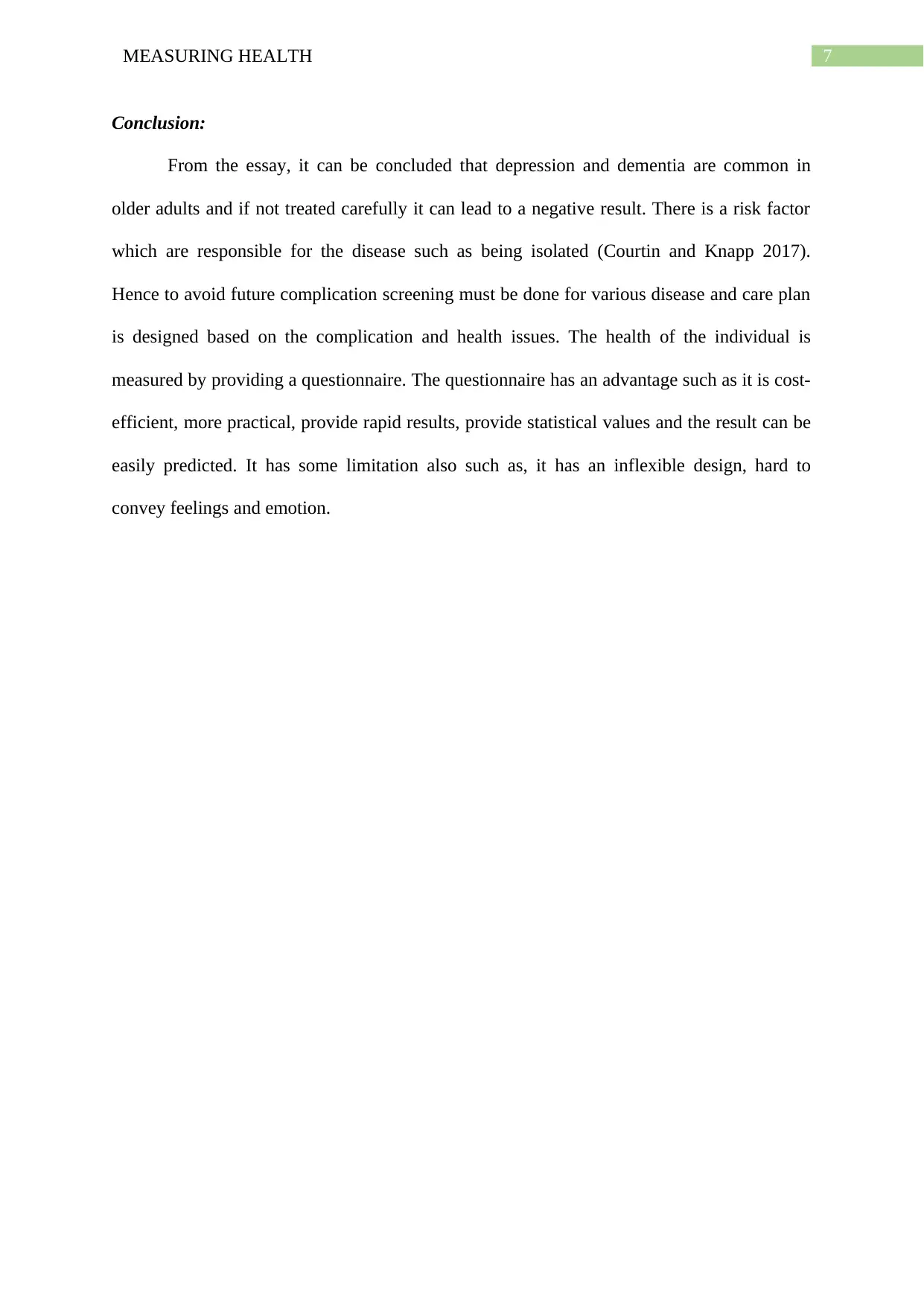
7MEASURING HEALTH
Conclusion:
From the essay, it can be concluded that depression and dementia are common in
older adults and if not treated carefully it can lead to a negative result. There is a risk factor
which are responsible for the disease such as being isolated (Courtin and Knapp 2017).
Hence to avoid future complication screening must be done for various disease and care plan
is designed based on the complication and health issues. The health of the individual is
measured by providing a questionnaire. The questionnaire has an advantage such as it is cost-
efficient, more practical, provide rapid results, provide statistical values and the result can be
easily predicted. It has some limitation also such as, it has an inflexible design, hard to
convey feelings and emotion.
Conclusion:
From the essay, it can be concluded that depression and dementia are common in
older adults and if not treated carefully it can lead to a negative result. There is a risk factor
which are responsible for the disease such as being isolated (Courtin and Knapp 2017).
Hence to avoid future complication screening must be done for various disease and care plan
is designed based on the complication and health issues. The health of the individual is
measured by providing a questionnaire. The questionnaire has an advantage such as it is cost-
efficient, more practical, provide rapid results, provide statistical values and the result can be
easily predicted. It has some limitation also such as, it has an inflexible design, hard to
convey feelings and emotion.
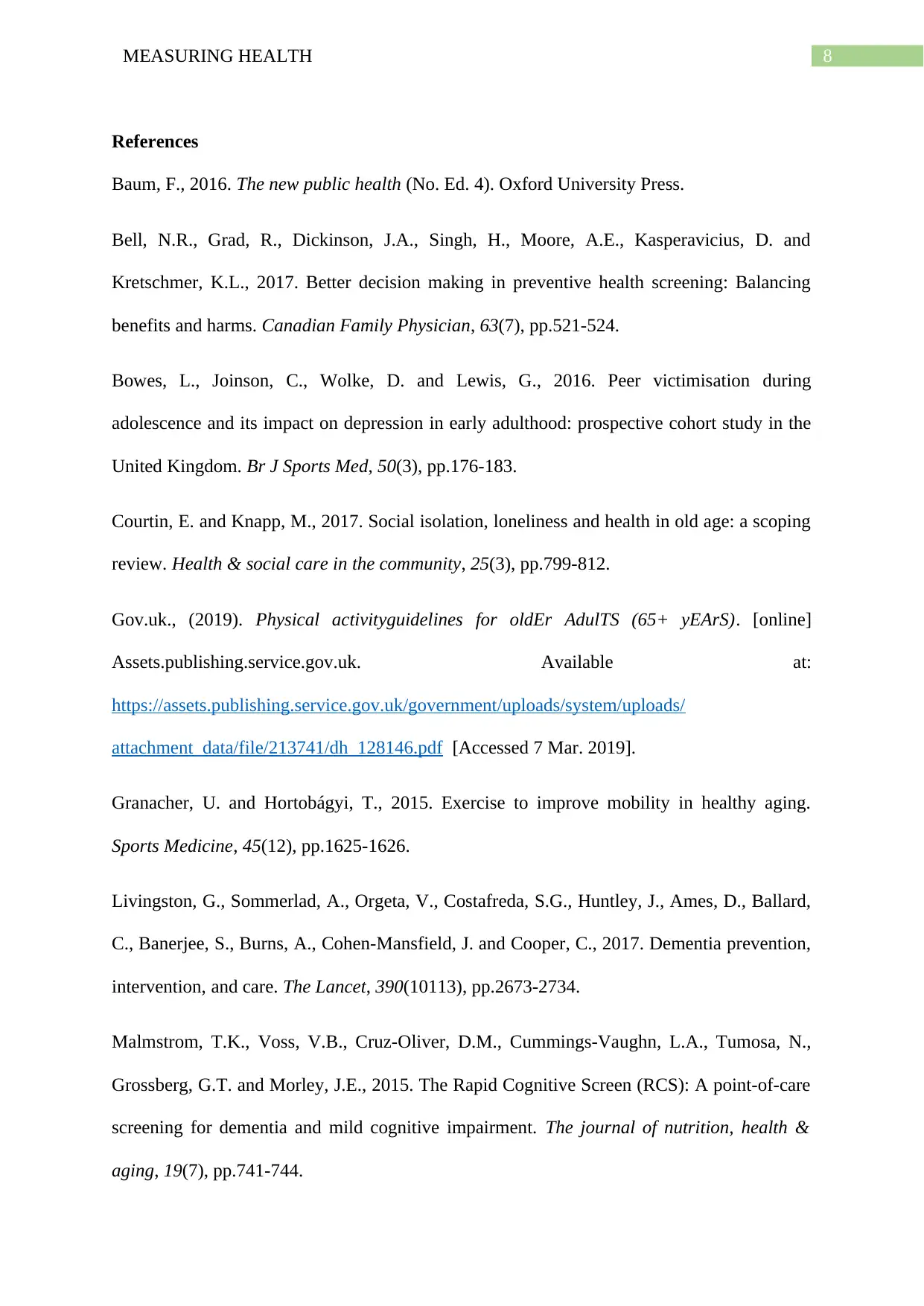
8MEASURING HEALTH
References
Baum, F., 2016. The new public health (No. Ed. 4). Oxford University Press.
Bell, N.R., Grad, R., Dickinson, J.A., Singh, H., Moore, A.E., Kasperavicius, D. and
Kretschmer, K.L., 2017. Better decision making in preventive health screening: Balancing
benefits and harms. Canadian Family Physician, 63(7), pp.521-524.
Bowes, L., Joinson, C., Wolke, D. and Lewis, G., 2016. Peer victimisation during
adolescence and its impact on depression in early adulthood: prospective cohort study in the
United Kingdom. Br J Sports Med, 50(3), pp.176-183.
Courtin, E. and Knapp, M., 2017. Social isolation, loneliness and health in old age: a scoping
review. Health & social care in the community, 25(3), pp.799-812.
Gov.uk., (2019). Physical activityguidelines for oldEr AdulTS (65+ yEArS). [online]
Assets.publishing.service.gov.uk. Available at:
https://assets.publishing.service.gov.uk/government/uploads/system/uploads/
attachment_data/file/213741/dh_128146.pdf [Accessed 7 Mar. 2019].
Granacher, U. and Hortobágyi, T., 2015. Exercise to improve mobility in healthy aging.
Sports Medicine, 45(12), pp.1625-1626.
Livingston, G., Sommerlad, A., Orgeta, V., Costafreda, S.G., Huntley, J., Ames, D., Ballard,
C., Banerjee, S., Burns, A., Cohen-Mansfield, J. and Cooper, C., 2017. Dementia prevention,
intervention, and care. The Lancet, 390(10113), pp.2673-2734.
Malmstrom, T.K., Voss, V.B., Cruz-Oliver, D.M., Cummings-Vaughn, L.A., Tumosa, N.,
Grossberg, G.T. and Morley, J.E., 2015. The Rapid Cognitive Screen (RCS): A point-of-care
screening for dementia and mild cognitive impairment. The journal of nutrition, health &
aging, 19(7), pp.741-744.
References
Baum, F., 2016. The new public health (No. Ed. 4). Oxford University Press.
Bell, N.R., Grad, R., Dickinson, J.A., Singh, H., Moore, A.E., Kasperavicius, D. and
Kretschmer, K.L., 2017. Better decision making in preventive health screening: Balancing
benefits and harms. Canadian Family Physician, 63(7), pp.521-524.
Bowes, L., Joinson, C., Wolke, D. and Lewis, G., 2016. Peer victimisation during
adolescence and its impact on depression in early adulthood: prospective cohort study in the
United Kingdom. Br J Sports Med, 50(3), pp.176-183.
Courtin, E. and Knapp, M., 2017. Social isolation, loneliness and health in old age: a scoping
review. Health & social care in the community, 25(3), pp.799-812.
Gov.uk., (2019). Physical activityguidelines for oldEr AdulTS (65+ yEArS). [online]
Assets.publishing.service.gov.uk. Available at:
https://assets.publishing.service.gov.uk/government/uploads/system/uploads/
attachment_data/file/213741/dh_128146.pdf [Accessed 7 Mar. 2019].
Granacher, U. and Hortobágyi, T., 2015. Exercise to improve mobility in healthy aging.
Sports Medicine, 45(12), pp.1625-1626.
Livingston, G., Sommerlad, A., Orgeta, V., Costafreda, S.G., Huntley, J., Ames, D., Ballard,
C., Banerjee, S., Burns, A., Cohen-Mansfield, J. and Cooper, C., 2017. Dementia prevention,
intervention, and care. The Lancet, 390(10113), pp.2673-2734.
Malmstrom, T.K., Voss, V.B., Cruz-Oliver, D.M., Cummings-Vaughn, L.A., Tumosa, N.,
Grossberg, G.T. and Morley, J.E., 2015. The Rapid Cognitive Screen (RCS): A point-of-care
screening for dementia and mild cognitive impairment. The journal of nutrition, health &
aging, 19(7), pp.741-744.
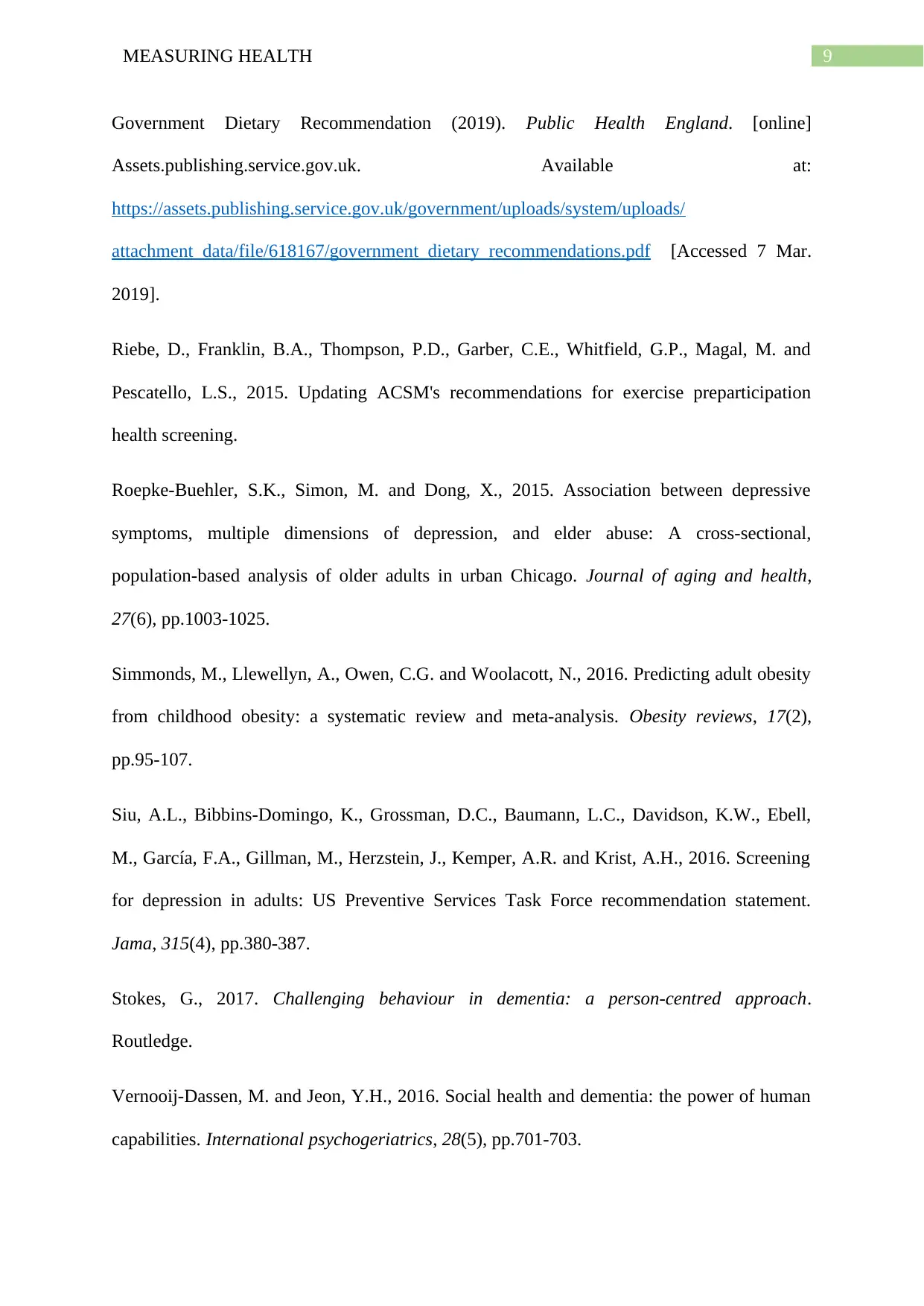
9MEASURING HEALTH
Government Dietary Recommendation (2019). Public Health England. [online]
Assets.publishing.service.gov.uk. Available at:
https://assets.publishing.service.gov.uk/government/uploads/system/uploads/
attachment_data/file/618167/government_dietary_recommendations.pdf [Accessed 7 Mar.
2019].
Riebe, D., Franklin, B.A., Thompson, P.D., Garber, C.E., Whitfield, G.P., Magal, M. and
Pescatello, L.S., 2015. Updating ACSM's recommendations for exercise preparticipation
health screening.
Roepke-Buehler, S.K., Simon, M. and Dong, X., 2015. Association between depressive
symptoms, multiple dimensions of depression, and elder abuse: A cross-sectional,
population-based analysis of older adults in urban Chicago. Journal of aging and health,
27(6), pp.1003-1025.
Simmonds, M., Llewellyn, A., Owen, C.G. and Woolacott, N., 2016. Predicting adult obesity
from childhood obesity: a systematic review and meta‐analysis. Obesity reviews, 17(2),
pp.95-107.
Siu, A.L., Bibbins-Domingo, K., Grossman, D.C., Baumann, L.C., Davidson, K.W., Ebell,
M., García, F.A., Gillman, M., Herzstein, J., Kemper, A.R. and Krist, A.H., 2016. Screening
for depression in adults: US Preventive Services Task Force recommendation statement.
Jama, 315(4), pp.380-387.
Stokes, G., 2017. Challenging behaviour in dementia: a person-centred approach.
Routledge.
Vernooij-Dassen, M. and Jeon, Y.H., 2016. Social health and dementia: the power of human
capabilities. International psychogeriatrics, 28(5), pp.701-703.
Government Dietary Recommendation (2019). Public Health England. [online]
Assets.publishing.service.gov.uk. Available at:
https://assets.publishing.service.gov.uk/government/uploads/system/uploads/
attachment_data/file/618167/government_dietary_recommendations.pdf [Accessed 7 Mar.
2019].
Riebe, D., Franklin, B.A., Thompson, P.D., Garber, C.E., Whitfield, G.P., Magal, M. and
Pescatello, L.S., 2015. Updating ACSM's recommendations for exercise preparticipation
health screening.
Roepke-Buehler, S.K., Simon, M. and Dong, X., 2015. Association between depressive
symptoms, multiple dimensions of depression, and elder abuse: A cross-sectional,
population-based analysis of older adults in urban Chicago. Journal of aging and health,
27(6), pp.1003-1025.
Simmonds, M., Llewellyn, A., Owen, C.G. and Woolacott, N., 2016. Predicting adult obesity
from childhood obesity: a systematic review and meta‐analysis. Obesity reviews, 17(2),
pp.95-107.
Siu, A.L., Bibbins-Domingo, K., Grossman, D.C., Baumann, L.C., Davidson, K.W., Ebell,
M., García, F.A., Gillman, M., Herzstein, J., Kemper, A.R. and Krist, A.H., 2016. Screening
for depression in adults: US Preventive Services Task Force recommendation statement.
Jama, 315(4), pp.380-387.
Stokes, G., 2017. Challenging behaviour in dementia: a person-centred approach.
Routledge.
Vernooij-Dassen, M. and Jeon, Y.H., 2016. Social health and dementia: the power of human
capabilities. International psychogeriatrics, 28(5), pp.701-703.
Secure Best Marks with AI Grader
Need help grading? Try our AI Grader for instant feedback on your assignments.

10MEASURING HEALTH
Who.int. (2019). WHO | Mental health: a state of well-being. [online] Available at:
https://www.who.int/features/factfiles/mental_health/en/ [Accessed 7 Mar. 2019].
Who.int. (2019). WHO | Mental health: a state of well-being. [online] Available at:
https://www.who.int/features/factfiles/mental_health/en/ [Accessed 7 Mar. 2019].
1 out of 11
Related Documents
Your All-in-One AI-Powered Toolkit for Academic Success.
+13062052269
info@desklib.com
Available 24*7 on WhatsApp / Email
![[object Object]](/_next/static/media/star-bottom.7253800d.svg)
Unlock your academic potential
© 2024 | Zucol Services PVT LTD | All rights reserved.





